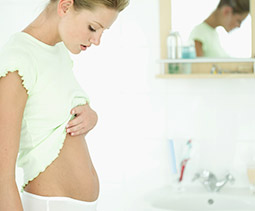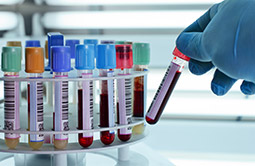In vitro fertilization is a chance for a miracle for women who are already desperate to become a mother naturally. After the transfer of tiny embryos, there is a period of uncertainty when the embryo tries to gain a foothold on the wall of the uterus and gain the right to life. A woman, on the other hand, closely monitors her own condition, paying attention to every little thing that can hint at a pregnancy that has taken place.
15 day after embryo transfer
 Approximately 5-6 days after the transfer, the embryo is implanted into the uterine wall and the fact of pregnancy can be considered recognized, but it is not possible to recognize it at this time. The body is just beginning to reorganize itself to serve as a home for a small life in the next 9 months.
Approximately 5-6 days after the transfer, the embryo is implanted into the uterine wall and the fact of pregnancy can be considered recognized, but it is not possible to recognize it at this time. The body is just beginning to reorganize itself to serve as a home for a small life in the next 9 months.
From the moment of implantation, chorionic gonadotropin begins to be actively produced. It is this hormone that is responsible for maintaining the normal course of intrauterine development of the embryo and is the main marker for confirming pregnancy.
The process of formation of the placenta and umbilical cord begins, which provide protection and nutrition of the fetus with all the necessary elements.
The embryo itself is actively growing. Rapid cell division occurs. Up to 15 DPP, the embryo grows from 0.2-0.3 mm at the time of transfer into the uterine cavity to almost 4 mm. The embryo prepares for the most important process in his life - the laying of internal organs from three layers:
- Ectoderm;
- Mesoderm;
- Endoderm.
At this time, the woman continues to take supportive hormonal therapy, which is mandatory for everyone after IVF, to reduce the risk of termination of pregnancy.
Lack of menstruation 15 days after ovulation
The main hint for a woman in determining pregnancy is the absence of menstruation after 15 DPO. The cessation of monthly bleeding is associated with hormonal changes in the body of the pregnant woman. After the ovary leaves the ovary, a corpus luteum is formed at the site of the ruptured follicle, which produces a large amount of progesterone - the main hormone of pregnant women, which regulates the restructuring of the body. It is he who suppresses the further maturation of oocytes for the entire period of pregnancy. The corpus luteum exists up to 12 weeks, after which the functions of progesterone secretion are transferred to the fully formed placenta.
In women after in vitro fertilization, the insufficient effect of their own hormones is compensated for with the help of supportive therapy, which can cause disruption of the natural menstrual cycle, even if the procedure is unsuccessful.
Sensations during pregnancy on the 15th day of DPO
Both natural pregnancy and the one that came after in vitro fertilization has the same set of signs that indicate its occurrence.
Of course, in the early stages, it is quite difficult to determine the fact of a long-awaited event by the mother's feelings alone, but there are several bells that serve as joyful tips for the expectant mother:
- Engorgement and tenderness of the breast. Many women in the very first days after fertilization may notice an increase in the volume of the mammary glands, their irritability and even slight soreness when touched, darkening and an increase in the size of the areoles;
 Feeling of heaviness in the lower abdomen. Most new pregnant women associate pulling sensations in the uterus with the approaching menstruation, and with in vitro fertilization - with the consequences of medical intervention. But in the absence of menstrual bleeding, heaviness in the abdomen can be the first of the symptoms of a pregnancy;
Feeling of heaviness in the lower abdomen. Most new pregnant women associate pulling sensations in the uterus with the approaching menstruation, and with in vitro fertilization - with the consequences of medical intervention. But in the absence of menstrual bleeding, heaviness in the abdomen can be the first of the symptoms of a pregnancy;- Constant feeling of tiredness. The restructuring of the body preparing for long-term bearing of a child is often accompanied by high fatigue of expectant mothers or mild colds caused by suppression of the immune system by progesterone;
- A drop in blood pressure and a slight increase in temperature also often occur during the first two weeks of pregnancy. Feelings of cold are possible, alternating with a feeling of stuffiness, caused by a change in thermoregulatory mechanisms;
- Increasing the emotionality of pregnant women is a well-known fact that can serve as confirmation of imminent motherhood;
- Sleep changes, sleeplessness at night, and a desire to sleep during the day may occur during the first weeks of pregnancy;
 Early toxicosis. Regular nausea in the morning, intolerance to the smells and tastes of previously favorite foods, as well as cravings for food that caused disgust, can speak of a frequent companion of pregnancy - toxicosis.
Early toxicosis. Regular nausea in the morning, intolerance to the smells and tastes of previously favorite foods, as well as cravings for food that caused disgust, can speak of a frequent companion of pregnancy - toxicosis.
It is worth noting that on the 15th DPP of the five-day period, the sensations, especially morning sickness, are more pronounced due to the powerful supportive hormonal therapy.
HCG level. 15 days after IVF
The amount of human chorionic gonadotropin in the blood is the main indicator that a woman who has undergone in vitro fertilization should be guided by when confirming pregnancy and its normal course.
After 15 DPP, hCG rises to a level high enough to accurately determine the onset of pregnancy. The amount of human choriogonadotropin increases with great speed, changing every day. As early as a week after fertilization, a blood test for hCG content can most likely predict future motherhood.
 In in vitro fertilization, the analysis usually takes place from the 12th to the 15th day after the embryo transfer. The values will differ for embryos placed in the uterus on the third day of their development and on the fifth day. Most often, five-day embryos are introduced, since they are the ones with greater viability.
In in vitro fertilization, the analysis usually takes place from the 12th to the 15th day after the embryo transfer. The values will differ for embryos placed in the uterus on the third day of their development and on the fifth day. Most often, five-day embryos are introduced, since they are the ones with greater viability.
When analyzing for 15 DPP five days, hCG should have the following values:
- The minimum content allowing pregnancy is 520 mU / ml;
- The average value indicating the normal course of the processes is 1380 mU / ml;
- The maximum value allowed for a singleton pregnancy is 2000 IU / ml.
The slow growth of hCG may indicate an ectopic, frozen pregnancy, a high threat of miscarriage.
Too high rates may indicate the risk of developing chromosomal abnormalities or bearing multiple fetuses.
Small deviations from the norms are not a reason for panic, but only a reason to seek advice from a specialist. Attention to their condition for women who become pregnant with the help of IVF is the key to the successful bearing of a healthy child!
